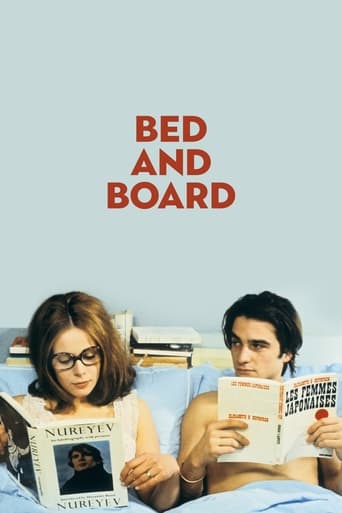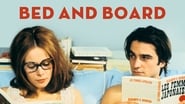vitaky2001
Truffaut turns a banal story about a newly wed couple, the birth of their first child, young man's infidelity, their separation and reunion, into a fascinating study of conjugal universe. At first glance, the central characters Antoine and Christine may appear to be happy, yet, as the story unfolds one can see their difficulty of relating to one another. As is usual with Truffaut's films, Domicile Conjugal presents the viewer with a highly dense text that constitutes perhaps the director's greatest achievement in his life-long exploration of relationship between men and women.Truffaut's central symbol in this film is staircase. The characters constantly go up and down stairs. The psychoanalytic meaning of it is clear enough and has in fact been used by Hitchcock, whose films Truffaut found inspiring. Downstairs, a lascivious neighbor tells Antoine that she is going to have him soon. Money (another key psychoanalytic symbol) is also exchanged below as Antoine reminds an oblivious mother to pay for the music lessons that Christine (a violinist) offers to her daughter. By contrast, upstairs is the space of high art (in addition to Christine, there is an opera singer living next door). It is also a space of conjugal relations, or rather an attempt at such relation. As the first strains between Antoine and Christine become apparent, Antoine brings home a portable winding stairs and makes Christine mount it when she practices her violin. Unlike Freud and Hitchcock, Truffaut never quite claims that the high and sunny floors of our personality are a mere cover-up for the dark recesses of basic instincts. Nevertheless, the constant ups and downs in Domicile conjugal suggest that marital life involves a lot of interaction between an individual's consciousness and the unconscious. Antoine, an autobiographic central character of Truffaut's cinematic universe, is known to director's fans as a boy who never grew up. In his late twenties as in his early teens, Antoine is entirely in love with his fantasies. The film starts as he dyes a bunch of carnations red by adding a substance to the water in which the flowers stand. Eventually, his pursuit of the absolute red color (an absolute passion?) leads him to overdose and burn the flowers down. As Antoine and Christine lie in bed, he reveals his fantasy to her by reading an obscenity into a news paper column. Looking for a supposedly serious job with an American company, Antoine ends up occupying himself with piloting toy ships in a miniature haven arranged on a pond (Truffaut will use the same image later in his La femme a cote). A consummate egoist enchanted with his own inner world, Antoine embarks upon a graphomanic enterprise of writing a novel, which, in Christine's words, will be his childish revenge upon his parents (a reference to Truffaut's 400 coups, and its central theme of a parentless childhood).The infantile nature of Antoine's character is also apparent from his reaction to the news of the birth of his son. Significantly, Antoine does not hear his colleague who tries to shout to him over a distance that he has a boy, and learns the sex of the child by looking through a binocular at a magazine picture featuring a boy and a girl that the colleague shows. Being absolutely self-centered, he tells neighbors about the news, phones someone, but forgets to bring flowers to Christine on a first post-natal visit. And then he projects his own fantasies upon the baby, envisions him as a Napoleon of the literary world, and declares that he will be his son's sole educator (which references Truffaut's fascination with the 18th century educational ideas in his L'Infant sauvage). Finally, Antoine also does not forget to name the boy Alphonse despite the fact that Christine liked a different name.Yet, Christine is not very much different. The whole episode in which they disagree on the names for the baby simply suggests that fathers and mothers have different fantasies about their children, that men and women have different fantasies… He calls Christine his sister, daughter or mother, while she imagines herself as his woman/wife (note the opening episode, when grocer and newspaper vendor call the newly wed Christine "mademoiselle" and she insists on being called "madame"). Whereas Antoine's pillow book is about Japanese women, Christine reads about Rudolf Nuriev, a famous ballet dance who had recently defected from the Soviet Union. As she and Antoine break apart, she takes his photo with their child out of the frame and one can see Nuriev's face below.Thus, the conjugal scenes in this film are a wonderful illustration of the idea that men and women take their fantasies with them as they go to bed. And yet, as Antoine's affair with the Japanese girl Kioyko demonstrates, pure fantasies are pure hell. Kioyko's foreignness indicates the impossibility of communication. The language is not the issue, as Kioyko speaks French. Yet, as Antoine soon discovers, it is impossible to converse with one's dream. As the screen of the French small talk disintegrates around him, Antoine finds himself alone with his pure fantasy of a woman, that is to say he finds himself alone pure and simple. For a garrulous Gaul like him, the silence of Antoine's last evening in restaurant with Kioyko proves to be a veritable torture from which he repetitively flees (upstairs!) to a telephone booth in order to TELL Christine that he loves her and kisses her tenderly. Yet, make no mistake: an ironic last episode of the film demonstrates that love between a man and a woman is a purely ritual thing that does or does not exist only for an external observer. Truffaut's bottom-line is that men and women are able to live together only when their fantasies do not clash with one another. Forever children, men and women play out their dreams together or alone. As Jacques Lacan argues (and Truffaut agrees), there can be no SEXUAL relationship
Polaris_DiB
Truffaut's Antoine Doinel avatar returns in a cute movie about a young man newly experiencing marital bliss. This means, of course, that arguments are to be had, babies to be birthed, and infidelity to be explored. Now of course I wouldn't mind a beautiful Japanese woman either, but I'm not married and this turn of events was rather predictable. Nevertheless, it's all romance and good cheer as Doinel slowly learns that he really does love his wife and no other, and grows more and more frustrated with the other woman who expects too much of him. At least it's not Fatal Attraction, but a strange Jan Svankmajer-like flower decomposing scene, followed by a campy reveal, makes the movie a little bit more interesting than your typical domestic drama.Though, to be perfectly honest, I prefer the 400 Blows. Nevertheless! Francophiles will have a lot of fun watching the small urban community that satellites the action, and Truffaut's direction and cinematography is gorgeous in its own right. Just don't expect anything profound in this comedy about a moody young Frenchman feeling a little confused (haven't seen that before, aye?).--PolarisDiB
rjyelverton
"Board" almost becomes a great film, but is dragged down by a regrettable, forgettable romance between Antoine and a stereotypically exotic, distant Asian temptress. Christine and Antoine are now married and "Board" will focus on the simultaneous distance and close connection that marriage can create. Antione finds himself bored with his wife sexually--"Bed and Bored"--without the challenge of pursuit, but ultimately finds himself longing the connection and comfort he shares with his lover.While "Kisses" featured a frequently slapdash editing style, Truffaut's direction in "Board" is fluid and dynamic. It opens with a delightful sequence following Christine's feet down a city street as we are cleverly introduced to Mrs. Doinel for the first time. "Kisses" is often chaotic and oddly directed while Truffaut appears to be in full control of this installment. The camera pans and swoops with precision and grace and the editing is concise. This film features some of the most assured direction of the series.Much of the film's action takes place in Antoine and Christine's neighborhood: a collection of apartment buildings with windows and doors emptying into a shared courtyard. It's a small, boisterous community whose characters in their boisterousness and choleric temper recall a Fellini ensemble. While in this neighborhood, the film enchants, but then we are taken outside of it and into a regrettable storyline involving another dead end job for Antoine and a boring affair.Antoine and Christine anchor the film and keep you watching. Leaud still charms and scenes late in the film when he realizes he loves Christine deeply, though his lust may have cooled, are touching and painful. The two portions of the film inside and outside the marriage are uncomfortably incongruous, but Truffaut's assured direction and the film's ensemble ultimately redeem the uneven film.
RARubin
No #4 in the Antoine series, five films beginning with 400 Blows, Antoine, the dreamer, has got himself a fine young wife, his opposite really, prim and well mannered. Their romantic first year is a series of funny neighbors and comical whimsy. I learned how to die the color of flowers, more interesting than one would think. I learned about hurrying a wife along by throwing her coat and bag down a stairway. I learned that relationships go wrong when one gives in to lust. Hey, I knew that.Jean-Pierre Leaud has a physical resemblance to Truffaut. These episodic films, the ones in color that I have seen remind one of a HBO mini-series. His autobiographical Doinel is from a broken family. In the 400 blows, a masterpiece really of the New French Cinema in the late 50's, we see the lonely kid grasping for understanding. In subsequent films, we see the young adult Doinel grasp at relationship and career. The next beautiful woman is always around the corner. In Bread and Board, the femme fatale is 70's Japanese Go Go Chick, Hiroko Berghauer. Notice the heavy eye make-up on the women that make them look like zombies.




